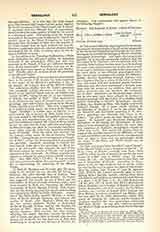

Genebrard, GILBERT, a learned Benedictine exegete and Orientalist, b. December 12, 1535, at Riom, in the department of Puy-de-Dome; d. February 16, 1597, at Semur, department of Cote-d’Or. In his early youth he entered the Cluniac monastery of Mausac near Riom, later continued his studies at the monastery of Saint-Allyre in Clermont, and completed them at the College de Navarre in Paris, where he obtained the doctorate in theology in 1562. A year later he was appointed professor of Hebrew and exegesis at the College Royal and at the same time held the office of prior at Saint-Denis de La Chartre in Paris. He was one of the most learned professors at the university, and through his numerous and erudite exegetical works became famous throughout Europe. Among his scholars at the College Royal was St. Francis de Sales, who in his later life considered it an honor to have had Genebrard as professor (Traite de l’Amour de Dieu, XI, 11). About 1578 he went to Rome, where he was honorably received by Sixtus V and stood in close relation to Allen, Baronius, Bosio, and other ecclesiastical celebrities. Upon his return, in 1588, he became one of the chief supporters of the Holy League in France. On May 10, 1591, he was appointed Archbishop of Aix by Gregory XIII, but accepted this dignity only after the express command of the pope. He was consecrated by Archbishop Beaton of Glasgow on April 10, 1592. As archbishop he remained a zealous leaguer, even after Henry IV became reconciled with the Church in July, 1593. The new king, however, became daily more popular and gained over to his side most of the Catholics. Genebrard saw that further opposition would be useless and, on November 15, 1593, sent his submission to the king (“Revue des questions historiques”, Paris, 1866, I, 616, note). This, however, did not prevent the Provencal Parliament from banishing him on September 26, 1596. For a short time he stayed at Avignon, but, being allowed by the king to return, he retired to the priory of Semur, which he held in commendam. Genebrard translated many rabbinic writings into Latin; wrote one of the best commentaries on the Psalms: “Psalmi Davidis vulgata editione, calendario hebraeo, syro, graeco, latino, hymnis, argumentis, et commentariis, etc. instructi” (Paris, 1577); is the author of “De Sancta Trinitate” (Paris, 1569); “Joel Propheta cum chaldaea paraphrase et commentariis”, etc. (Paris, 1563); “Chronographiae libri IV” (Paris, 1580), and numerous other works. He also edited the works of Origen (Paris, 1574).
MICHAEL OTT

